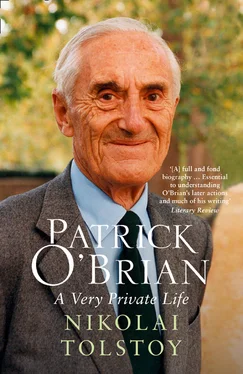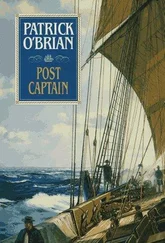Making their way across country to the northern frontier, the travellers encountered weather and countryside less congenial. Back in Spain, Patrick attended mass at Santiago, but was strangely unimpressed by town or cathedral. Passing Corunna, they became alarmingly trapped for a while in a snowdrift beyond Villalba. Fortunately the summit of the hill proved not far, and Patrick stumbled behind on foot as my mother gingerly enticed the car towards it. ‘When we reached the sea at Ribadeo (a very pleasant looking place … hundreds of duck down on the water; tufted duck mostly – and every promise of trout, if not of salmon too) we suddenly saw the Cordillera, pure white with deep snow.’
Passing through Basque country, where ‘the red berets were worn quite naturally’, they came to Guernica, scene of an infamous German air raid during the Civil War – ‘and a melancholy sight it was – every building new, almost, and still a number of ruins’. Driving as fast as they could along precipitous coastal roads, frequently blocked by landslides, they finally gained the frontier at Irun. ‘A toll-bridge, and we were in France again. French customs pleasant, sensible – Budd’s utter fury at their touching sacred car and even prodding food parcels.’
The fine French roads sped them across country, and on 18 February 1953, ‘in spite of the snow we were home at half past five, with an enormous post’. The news was generally good, especially a welcome cheque for £100 from Rupert Hart-Davis. Their neighbours the Rimbauds were warmly welcoming, as was their cat Pussit Tassit (who had managed to become pregnant). ‘How pleasant it is, our own place, and how queer the familiarity.’ Patrick calculated that they had travelled 3,674 miles, at a total motoring cost of 17,236 francs (about £15).
They had been away from home for a month, the longest foreign tour (not counting England) in which they ever engaged. Although there is little direct evidence of the use to which it may have been applied in his literary work,[fn2] there can be no doubt that Patrick’s extended immersion into the dramatically archaic world of Spain and Portugal as it was then played a significant function in conferring the astonishing gift for immersion in past worlds which represents so marked an aspect of his historical fiction. Nearly thirty years later he came upon his diary record, noting wistfully: ‘I read abt our journey in darkest Spain 1953 – forgotten or misremembered details – how it all comes to life!’
At the time, however, it seems that Patrick was pondering further work on contemporary themes. Shortly after their return, he reverted to his planned series of short stories. In March he wrote ‘The Walker’, and on 7 April my mother ‘Sent off The Walker, The Crier, The Silent Woman & The Tailor to C[urtis]B[rown] New York.’ Unfortunately, the last three tales have not survived.
Although the journey around the Iberian peninsula had proved both entertaining and (it was hoped) an inspiring source for future writing, before long Patrick and my mother found themselves reverting to continued frustration over their mode of existence in their cramped quarters in the rue Arago. During a brisk March walk up to the Madeloc tower, they ‘Agreed on discontent with present way of life: sick of peasants so close to our life, need garden & hens & bees so as to be able really to save mon[ey].’
Time appeared slipping by, without adequate achievement to slow its passage. In April Patrick received news from his family in England that his once-dreaded giant of a father had suffered a stroke. Patrick, who throughout his life kept in regular touch with his family, must already have been aware of his declining health. A profoundly formative era of his past, wretched though it had largely been, appeared to be approaching extinction within the vortex of vanished years. It was at this time (1953) that he began work on an autobiographical novel, which in its final form completed years later evoked years of childhood and adolescence, filling him with a complex amalgam of nostalgia, resentment, and shame.[fn3] His work on this project, which preoccupied him intermittently over the next two years, will be recounted in due course. As ever, my mother played a strongly supportive role in the writing, and was deservedly gratified by Patrick’s heartfelt acknowledgement: ‘P. gave me immense pleasure by saying he values me most as critic.’
Further matter for concern arose again concerning Patrick’s son Richard. Poor reports from school, together with a ‘horrible letter’ from his mother, persuaded Patrick and my mother to ‘decide to take R. & have him work for the school cert. with us, by a correspondence course’. The project was, however, postponed for the present, until July when Richard arrived for his summer holiday at Collioure.
Enterprising as ever, he ignored his mother’s apprehensive objections, cycling all the way from Dieppe, to whose Poste Restante my mother transmitted 5,000 francs for travelling expenses.[fn4] Equipped only with a school atlas as guide, Richard arrived cheerful and excited at the beginning of August.
Collioure proved particularly lively and sociable on this occasion. Within days of Richard’s arrival he made a memorable contact. Two schoolmistresses from England came to stay in the town, accompanied by four of their pupils. One of the pair, Mary Burkett, met my parents and became a friend for some years (she had an aunt living near Collioure). It was not long before Richard became friends with the schoolgirls, and one in particular attracted his close attention.
One evening my mother invited the girls to dinner, after which Richard and another boy named Pat entertained their new friends:
All day preparing dinner (Spanish rice). V. successful, whole school. They are wonderfully pleasant young things. After dinner Pat came, & he & Richard escorted Susan, Wendy, Anne-Louise & Jill to fair. R. home at midnight. He prefers Susan, & Pat Wendy. Susan is the best.
Thereafter romance blossomed, and Richard and Susan were together every day until 26 August, when sadly the school party returned to England. No sooner had they been waved off at Perpignan railway station than ‘R. wrote to Susan: says he is going to see her the day after he reaches London.’ They continued in touch, until on 10 September Richard himself returned to England:
R. had one [letter] from Sue & ever since (2 pm) has been writing back to her. P. took R’s bike to P. Vendres & sent it off. Saw R. off at Port-Vendres very sadly, in great wind & with black & purple sky. R. said this has been his best holiday. The house is so sad without him.
Richard had always loved his holidays in Collioure, but this time there had been especial reason for enjoyment. On his return to London, he wrote: ‘Thank you both so very much for the best holiday that I have ever had. And it really was the best.’ He and Susan had now become fast friends:
The [Cardinal Vaughan] school’s secretary stopped me and asked whether the Mr O’Brian that had written The Catalans[fn5] was my father. With huge pride I said ‘Yes’. Susan has shown me a revue of the Frozen Flame [the book’s British title] and it looked very good …
Now I am going to begin. Susan sent me a card saying that would I like to hear a lecture on ‘Everest’. Well Susan brought her two brothers and there [ sic ] two friends to hear the lecture … Her brothers are extremely pleasant to say the very least. And the lecture given by Hunt, Edmund Hillary and Low was absolutely superb …
Susan also invited me down to their house for lunch and tea. Was I scared, as at the last tea-party I sat down on the tea-pot. Her parents are wonderful, they really are. Their house, gee. Susan had told me that it was a small thing. Sixteen rooms and grounds that have a tennis court, flower garden kitchen garden, goat-house and hen house and a tool shed.
Читать дальше












